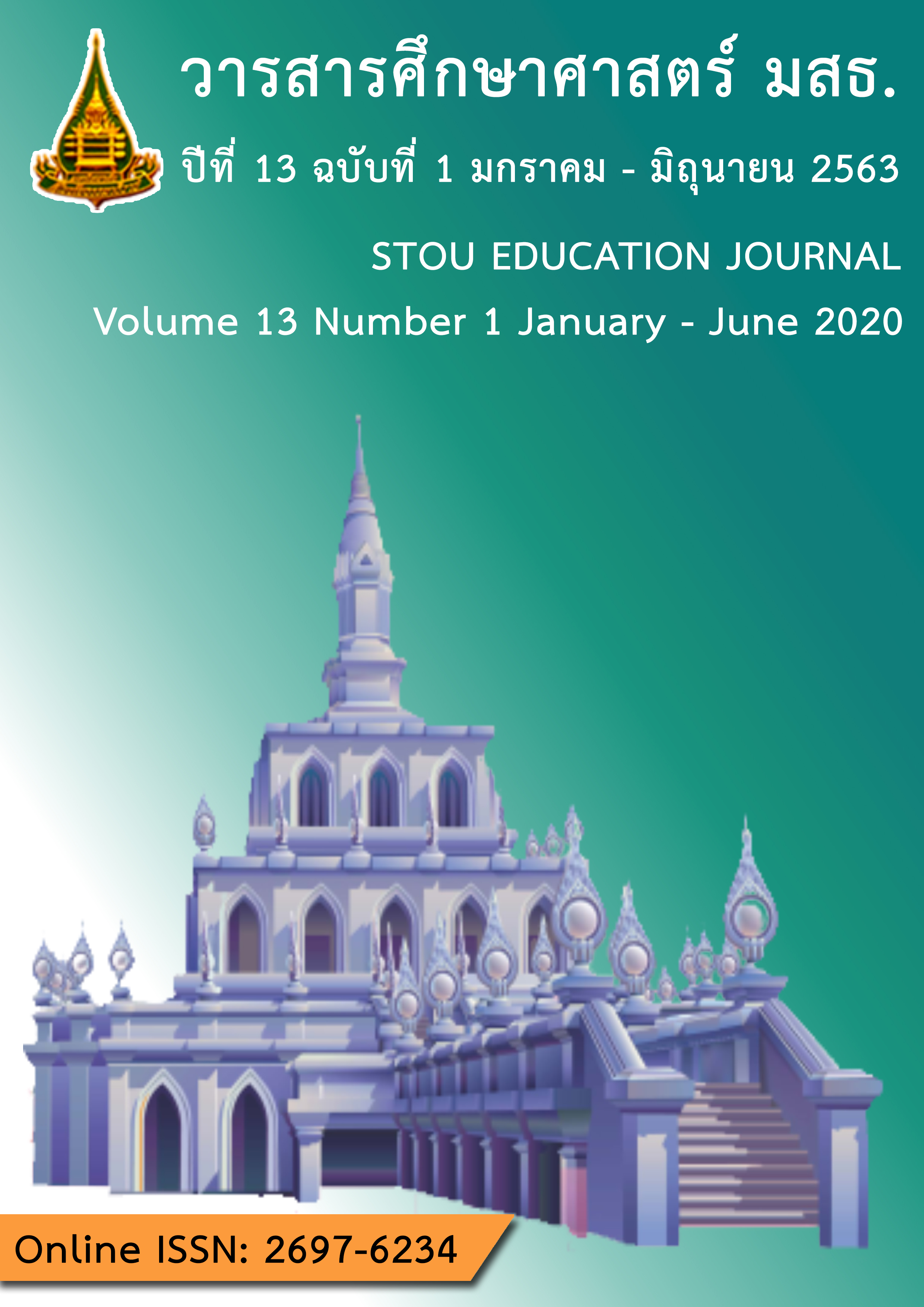การพัฒนารูปแบบการเรียนการสอนออนไลน์แบบเปิดตามแนวคิดการเรียนรู้ร่วมกัน สำหรับผู้เรียนกลุ่มใหญ่ที่มีลีลาการเรียนรู้แตกต่างกัน
Main Article Content
บทคัดย่อ
การวิจัยมีวัตถุประสงค์เพื่อ 1) พัฒนารูปแบบการเรียนการสอนออนไลน์แบบเปิดตามแนวคิดการเรียนรู้ร่วมกันสำหรับผู้เรียนกลุ่มใหญ่ที่มีลีลาการเรียนรู้แตกต่างกัน 2) สร้างบทเรียนออนไลน์ฯ และ 3) ศึกษาผลการใช้รูปแบบการเรียนการสอนออนไลน์แบบเปิดฯ ประชากร คือ ผู้ลงทะเบียนและทำกิจกรรมในรายวิชาบนเว็บไซต์ www.thaimooc.org จำนวน 306 คน ใช้ระยะเวลาเรียน 6 สัปดาห์ เครื่องมือวิจัย ได้แก่ 1) บทเรียนออนไลน์ฯ 2) แบบทดสอบวัดผลสัมฤทธิ์ทางการเรียน และ 3) แบบประเมินความพึงพอใจของผู้เรียนที่มีต่อการเรียนการสอนออนไลน์แบบเปิดฯ สถิติที่ใช้ในการวิเคราะห์ข้อมูล ได้แก่ ร้อยละ ค่าเฉลี่ย และส่วนเบี่ยงเบนมาตรฐาน ผลการวิจัยพบว่า 1) รูปแบบการเรียนการสอนออนไลน์แบบเปิดฯ มี 3 องค์ประกอบ ได้แก่ (1) ปัจจัยนำเข้า มี 6 ประเด็น คือ การวิเคราะห์รูปแบบการเรียนรู้ของผู้เรียน การวิเคราะห์เนื้อหา การออกแบบกิจกรรมการเรียนการสอน การออกแบบ MOOC แหล่งทรัพยากรการเรียนรู้ และการวิเคราะห์เครื่องมือที่ใช้ในการเรียนรู้ (2) กระบวนการมี 3 ขั้นตอนหลัก คือ เตรียมการสอน การสอน และตรวจสอบผลงานและทดสอบ และ (3) ผลลัพธ์ มี 3 ประเด็น คือ ผลสัมฤทธิ์ทางการเรียน การเข้าร่วมกิจกรรมการเรียน และความพึงพอใจในการเรียน ซึ่งรูปแบบการเรียนการสอนออนไลน์แบบเปิดฯ มีคุณภาพในระดับมากที่สุด มีค่าเฉลี่ย 4.57 2) บทเรียนออนไลน์ฯ มีคุณภาพอยู่ในระดับมากที่สุด มีค่าเฉลี่ย 4.63 และมีค่าประสิทธิภาพ 77.00/76.33 และ 3) ผลการใช้รูปแบบฯ พบว่า ผู้เรียนมีคะแนนผลสัมฤทธิ์ทางการเรียนเฉลี่ย 35.82 โดยผู้เรียนมีคะแนนเฉลี่ยจากการเข้าร่วมกิจกรรมการเรียน 41.47 คะแนน ซึ่งผู้เรียนกลุ่มผู้วิเคราะห์ความคิดสร้างสรรค์มีคะแนนเฉลี่ยมากที่สุด 42.13 คะแนน และผู้เรียนมีความพึงพอใจในระดับมากมีค่าเฉลี่ย 4.45
Article Details
เอกสารอ้างอิง
จินตวีร์ คล้ายสังข์. (2556). MOOCs PEDAGOGY: จาก OCW, OER สู่ MOOCs เครื่องมือเพื่อการเรียนรู้สำหรับผู้เรียนยุคดิจิทัล. การประชุมวิชาการระดับชาติด้านอีเลิร์นนิง ประจำปี 2556. กรุงเทพมหานคร: ThaiCyberU.
ใจทิพย์ ณ สงขลา. (2550). E-Instructional Design วิธีวิทยาการออกแบบการเรียนการสอนอิเล็กทรอนิกส์. กรุงเทพมหานคร: ศูนย์ตำราและเอกสารทางวิชาการ คณะครุศาสตร์ จุฬาลงกรณ์มหาวิทยาลัย.
ฉลอง ทับศรี. (2549). การออกแบบระบบการเรียนการสอน (Instructional Design). เอกสารการสอนวิชาการออกแบบการเรียนการสอน (423511). ชลบุรี: ภาควิชาเทคโนโลยีทางการศึกษา คณะศึกษาศาสตร์ มหาวิทยาลัยบูรพา.
ชัยยงค์ พรหมวงศ์. (2556). การทดสอบประสิทธิภาพสื่อหรือชุดการสอน.วารสารศิลปากรศึกษาศาสตร์วิจัย, 5(1). 5-20. สืบค้นจาก http://www.kmutt.ac.th/jif/public_html/article_detail.php?ArticleID=130421
ทิศนา แขมมณี. (2553). ศาสตร์การสอน: องค์ความรู้เพื่อการจัดกระบวนการเรียนรู้ที่มีประสิทธิภาพ (พิมพ์ครั้งที่ 12). กรุงเทพมหานคร: สำนักพิมพ์แห่งจุฬาลงกรณ์มหาวิทยาลัย.
ปราวีณยา สุวรรณณัฐโชติ และเสมอกาญจน์ โสภณหิรัญรักษ์. (2560). มาตรฐานและแนวปฏิบัติการเรียนการสอน MOOC ที่ได้รับการยอมรับในระดับนานาชาติ. กรุงเทพมหานคร: โครงการมหาวิทยาลัยไซเบอร์ไทย สำนักงานคณะกรรมการการอุดมศึกษา.
ปิยะฉัตร จิตต์ธรรม. (2557). เอกสารประกอบการอบรมเชิงปฏิบัติการ “ความสร้างสรรค์และนวัตกรรมทางการศึกษา”. สถาบันนวัตกรรมการเรียนรู้ มหาวิทยาลัยมหิดล.
พิมพ์พันธ์ เดชะคุปต์ และพเยาว์ ยินดีสุข. (2557). การจัดการเรียนรู้ในศตวรรษที่ 21. กรุงเทพมหานคร: โรงพิมพ์แห่งจุฬาลงกรณ์มหาวิทยาลัย.
วรรณพงษ์ เตรียมโพธิ์ และอาทร นกแก้ว. (2557). เอกสารประกอบการอบรมเชิงปฏิบัติการ “ผู้เรียน Gen Z เรียนรู้ได้อย่างไร”. สถาบันนวัตกรรมการเรียนรู้ มหาวิทยาลัยมหิดล.
วิจารณ์ พานิช. (2555). วิถีสร้างการเรียนรู้เพื่อศิษย์ ในศตวรรษที่ 21. กรุงเทพมหานคร: ตถาตา พับลิเคชั่น จำกัด
อาภรณ์ ใจเที่ยง. (2553). หลักการสอน (พิมพ์ครั้งที่ 5). กรุงเทพมหานคร: โอเดียนสโตร์.
เอมอร กฤษณะรังสรรค์. (2558, สิงหาคม 1). รูปแบบการคิด (Cognitive Style) และรูปแบบการเรียนรู้ (Learning Style). สืบค้นจาก http://www.novabizz.com/NovaAce/Learning/Cognitive_Style.htm
Altowairiki, N. F. H. (2013). Instructors' and students' experiences with online collaborative learning in higher education. (Master thesis ). Retrieved from https://prism.ucalgary.ca/handle/11023/850
Barkley, E. F., Major, C. H., & Cross, P. (2014). Collaborative learning techniques: A handbook for college faculty (2nd ed.). San Francisco: Jossey-Bass, A Wiley Brand.
Claffey, G. F., Jr. (2015). MOOC Learning and impact on public higher education (Doctoral dissertation). Retrieved from https://search-proquest-com.unco.idm.oclc.org/docview/1728802935?pq-origsite=summon
Culatta, R. (2013). ADDIE Model. Retrieved from http://www.instructionaldesign.org/models/addie.html
Globalvision. (2013, September 23). Trend Watch: Massive Open Online Courses. Retrieved from http://www.globalvision.com.au/archives/1152
Grunewald, F., Meinel, C., Totschnig, M., & Willems, C. (2013). Designing MOOCs for the support of multiple learning styles. In Hernádez-Leo, D., Ley, T., Klamma, R., & Harrer, A. (2013). Scaling up learning for sustained impact: 8th European conference, on technology enhanced learning, EC-TEL 2013
Gulatee, Y., & Nilsook, P. (2014). Elements of learning design for MOOCs. Retrieved from https://www.academia.edu/19520807/Elements_of_Learning_Design_for_MOOCs?email_work_card=view-paper.
Kop, R. (2011). The challenges to connectivist learning on open online networks: Learning experiences during a massive open online course. The International Review of Research in Open and Distributed Learning, 12(3), 19-38. doi:10.19173/irrodl.v12i3.882
Langrehr, J. (2005). Assessing creative & critical thingking, Victoria: Hawker Brownlow Education.
Li, K. (2015). Motivating learners in massive open online courses: A design-based research approach (Doctoral dissertation). Retrieved from https://eric.ed.gov/?id=ED567912
Murray, S. (2013). “What is the Media & Cultural Studies of the MOOC?” response media and culture. Retrieved from http://blog.commarts.wisc.edu/2013/03/11/MOOC/
Spector, J. M. (2014). Remarks on MOOCS and mini-MOOCS. Educational Technology Research and Development, 62(3), 385-392. doi:10.1007/s11423-014-9339-4
Stanley, L. E. (2015). A qualitative study of instructional design in massive open online courses (MOOCs) (Doctoral dissertation). Retrieved from https://search.proquest.com/openview/e92752606178e5a1a3583095889f5148/1?pq-origsite=gscholar&cbl=18750&diss=y
Wang, C., Shannon, D. M., & Ross, M. E. (2013). Students' characteristics, self-regulated learning, technology self-efficacy, and course outcomes in online learning. Distance Education, 34(3), 302-323. doi:10.1080/01587919.2013.835779
Wong, J., Baars, M., Davis, D., Van Der Zee, T., Houben, G., & Paas, F. (2019). Supporting self-regulated learning in online learning environments and MOOCs: A systematic review. International Journal of Human-Computer Interaction, 35(4-5), 356-373. doi:10.1080/10447318.2018.1543084


